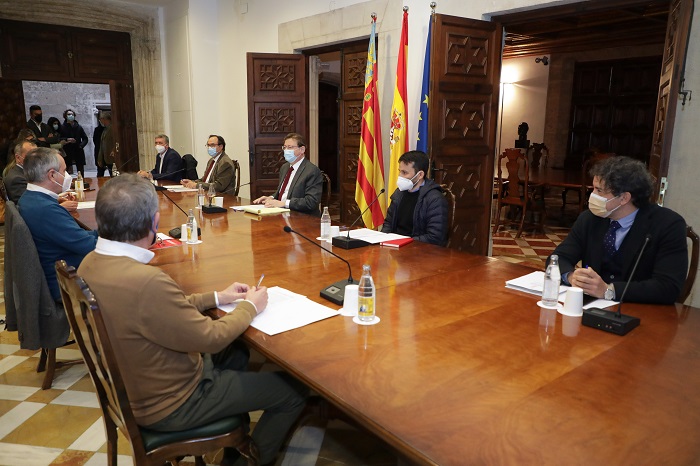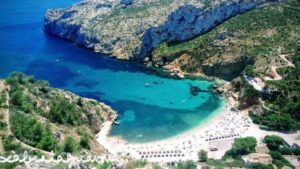340 million euros made available for sectors most affected by COVID-19
Ximo Puig presents ‘Plan Resiste’ for the urgent reactivation of struggling sectors.

Monday 18th January 2021 | Xàbia AL DIA
Ximo Puig, president of the Generalitat Valenciana, has presented details of the contingency plan entitled ‘Resiste’ which has made some 340 million euros available to try and minimize the damage and reactivate those economic sectors most affected by the restrictions imposed to deal with the ongoing COVID-19 pandemic.
The president explained that the aid package will benefit some 21,000 companies and 43,000 self-employed workers in sectors that have been most sensitive to the paralysis of social movement, such as hotels and tourist accommodation, the hotel and restaurant industry, the tourism sector (travel agents, tour operators and reservation services), and artistic and leisure activities (performing arts, management of show venues, gymnasiums, amusement parks and children’s play centres).
Puig presented the initiative ‘Plan Resiste’ after a meeting with Arturo León, general-secretary of the CCOO-PV, Ismael Sáez, general-secretary of the UGT-PV, and Salvador Navarro, president of the CEV. The meeting was also attended by Vicent Soler, Minister of Finance and Economic Model, Rafa Climente, the Minister for Sustainable Economy, Productive Sectors, Commerce and Labour, and Vicent Marzà, the Minister for Education, Culture and Sports.
During his address, the president assured that the regional government was concentrating its management of overcoming the pandemic and on reactivating the economy because the priority now is “saving lives, saving jobs and companies, and saving families”, and all this will be done “simultaneously”.
He added that since the emergence of COVID-19, the Generalitat had allocated more than 1,000 million euros to face the pandemic, of which more than 170 million has been allocated to offset the impact on workers, the self-employed and private businesses.
He also highlighted the fact that the Comunidad Valenciana has been the autonomous region that has allocated the most aid to self-employed workers, a total of 57 million euros. However, further restrictions imposed in the region requires “taking a new step” in supporting the productive fabric of society in the region.
Regarding the need to support the economic sectors to which the plan is directed, the president explained that, according to data available at the end of 2020, the hospitality sector represented “almost half of the workers who continue in ERTE and the self-employed receiving assistance for cessation of activity”. Likewise, he pointed out that since the beginning of the pandemic, these sectors have suffered 30% of the loss of added value and 59% of the destruction of employment in the Comunidad Valenciana. “For this reason, the Public Administrations are obliged to protect employment and the activity of companies in the period of pause in their normal activity.”
The president highlighted the agility with which the agreement on the ‘Plan Resiste’ has been reached, thanks to a series of meetings over the last ten days with employer’s associations and unions to examine the support required by the sectors most affected. Further meetings have been held with regional councils, city councils and the Valencian Federation of Municipalities and Provinces to agree on the COVID-19 Municipal Cooperation Fund, and thus the ‘Plan Resiste’ has been designed.
The Four Aid Blocks
During his speech, the president explained that the contingency plan has been divided into four blocks:
1 – 105 million euros in direct aid to companies, the self-employed, and workers affected by ERTE
2 – 8 million euros of specific aid for sectors with sustained damage throughout the pandemic.
3 – 100 million euros through new financial instruments of the Valencian Institute of Finance (IVF).
4 – 127 million euros, from the COVID-19 Municipal Cooperation Fund, agreed with councils and municipalities.
It should be noted that the different aid packages will not be exclusive, so that the same company or self-employed person may opt for more than one, with the aim that the ‘Plan Resiste’ will have a real impact throughout the territory and respond well to the needs of the different realities that can be found in each sector.
The main objective of the first block of aid is to provide some 80 million euros of direct aid from the Generalitat Valenciana aimed at reducing up to 100% of the Social Security contributions of more than 21,000 companies and 43,000 self-employed workers from the accommodation and hospitality sectors, travel agencies, and the artistic, recreational and leisure sectors.
Likewise, it is planned that 8 million euros will be granted to the 26,000 self-employed workers most affected by the total closure of their activity, or the drastic reduction in income. It is autonomous aid that will be complementary to the benefit that they would already been receiving from Social Security.
In the same way, it has been planned to allocate 17 million euros through direct regional aid to the 48,000 workers who are still on ERTE and who suffer a situation of reduced wages “that is taking too long”.
The president also announced a specific line of 8 million euros to support leisure and entertainment activities – with special attention to nightlife – which has suffered from the restrictions over the past few months to try and contain the pandemic and from which they will benefit, especially banquet halls, discos, pubs and theatre cafés.
The third block of aid, some 100 million euros, will see the creation of two new business financing instruments “with very favourable conditions” which the IVF will launch “with the aim of providing liquidity and solvency to companies during 2021”.
On one hand, it is a line of subsidized loans of up to 750,000 euros for companies related to leisure, accommodation, and hospitality, and related activities, through which the IVF intends to mobilize some 50 million euros. These loans include a non-returnable portion of up to 30%.
On the other hand, a line of up to 800,000 euros has been created for participatory loans “for companies with a limited financial situation that were viable before the pandemic”. With this line, the IVF intends to mobilize another 50 million euros.
Finally, the president highlighted the creation of the COVID-19 Municipal Cooperation Fund, which has been expanded to 127 million euros by also including aid for arts and crafts and other sectors that have been suffering the consequences of the pandemic to a greater extent.
Click on the link below to read the original on Xàbia AL DIA




